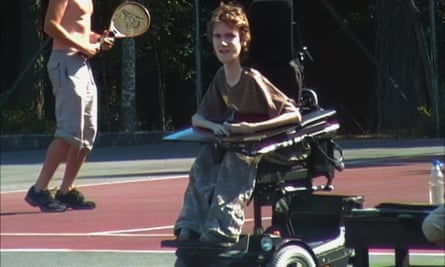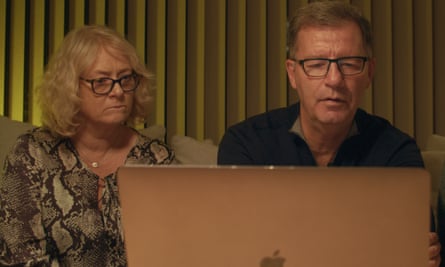The night after their son Mats died aged just 25, Trude and Robert Steen sat on the sofa in their living room in Oslo with their daughter Mia. They couldn’t sleep. “Everything was a blur,” remembers Trude of that day 10 years ago. “Then Robert said, ‘Maybe we should reach out to Mats’ friends in World of Warcraft.’”
Mats was born with Duchenne muscular dystrophy, a progressive condition that causes the muscles to weaken gradually. He was diagnosed aged four and started using a wheelchair at 10. By the end of his life, Mats could only move his fingers, and required a tube to clear his throat every 15 minutes. As he became increasingly disabled, he spent more time gaming: 20,000 hours in his last decade (about the same as if it were a full-time job).
Trude and Robert wondered how they could share the news of his death with his online acquaintances. They didn’t have access to his WoW account, but Robert found the password to Mats’ blog, and they wrote a post. It began: “Our beloved son, brother and best friend left us this night …” But, they wondered, would anyone read it?
Trude and Robert were stunned by the response. Emails started pouring in from around the world: “Mats’ passing has hit me very hard.” “Mats was AWESOME.” “You should be proud of your son.” “Mats was a real friend to me.” The couple had been anguished that Mats’ existence was lonely, that illness had isolated him, but here were messages, some pages long, from his close friends on WoW. To the uninitiated, WoW looks a bit like Lord of the Rings, set in a fantasy world called Azeroth populated by trolls, elves and medieval glamourpusses waging war with fancy swords.

Nearly a decade earlier, aged 17, Mats had created an alter ego in WoW. Lord Ibelin Redmoore was a private investigator with flowing golden hair, the physique of Thor, and a roguish charm. Mats had been playing as the character for years, but the emails were the first inkling his parents had of how deep his connections were in the gaming community. The story is now told in The Remarkable Life of Ibelin, an extraordinary documentary, four years in the making, about to open in cinemas and arriving on Netflix later this month.
I meet Trude and Robert in a London hotel. Recently Robert has been travelling around Norwegian schools with the film. “I think I’ve seen it 150 times,” he says with a smile. They are a warm couple, direct and open. The closeness of their family shines through all of The Remarkable Life of Ibelin.
The Steens had been approached before to make a film about Mats. “We said no to all of them,” says Robert. “It was too close, too personal, too emotional.” But they felt a connection to Benjamin Rees, a film-maker who, at 35, is the same age as Mats would have been had he lived.
The Steens like to film everything, and the documentary begins by telling the story of Mats’ life through their home movies. At screenings, this part of the film usually ends with half the audience in tears. It features footage of Trude in hospital after giving birth, stroking Mats’ cheek in wonder at this little miracle. We watch Mats taking his first steps at around one-year-old, proud as punch. There was no suggestion that anything was the matter at that point. It was clearer by the time he was three. “Mats was staggering and falling a lot,” remembers Trude. The doctors initially dismissed the couple as anxious first-time parents, before Mats was finally diagnosed with Duchenne MD at four.
One of the most painful moments in the film is Trude opening up about the guilt she feels about Mats’ illness, because she is the carrier of the Duchenne gene. “I still feel that sometimes,” she admits today. “I know it’s wrong. I spoke to Mats about it. He told me, ‘Don’t say that mum. It’s not your fault.’” Her eyes fill with tears. She gave up her job as an adviser to the parliament in Oslo to look after Mats for a decade. “The bond was very strong. We were so close.”
In the documentary, we also hear from Mats – his words, from the blog, are spoken by an actor. He is funny and insightful – and passionate about gaming: “It’s not a screen – it’s a gateway to wherever your heart desires.”
Then the film makes a complete swerve, suddenly switching to animation, plunging the audience into WoW. It’s a move that will baffle some, but feel like a stroke of genius to others. Rees commissioned animators to reconstruct Mats’ virtual life, with every line written by Mats and his role-player friends as they collaborate on the universe inside the game – culled from 42,000 pages of dialogue. “It almost feels as if they’re writing a book in real time,” says Rees.
We see Ibelin’s first kiss with Rumour, the alter ego of a Dutch gamer called Lisette Roovers. Mats wrote about the kiss on his blog: “It was just a virtual kiss, but boy I could almost feel it.” The moment is especially poignant because Mats also wrote about how relationships felt out of his reach: “Love was always a tricky subject for me. It feels like it’s not meant for me.”
after newsletter promotion
Mats made close friends online and touched their lives. But for years he hid his illness in WoW, a place where he wasn’t defined by disability. “Games are my sanctuary,” he wrote. “I am safe here, valued.” But in the summer of 2013 he started the blog, which he did eventually share with some of his gaming friends.

The Remarkable Life of Ibelin arrives at a time when parents are agonising over how much screen-time to give their kids. In Norway there is a saying: “Good people climb trees.” But because of his disability, Trude and Robert let Mats spend more time gaming than other children. He was on his Game Boy during breaks at school while other kids played football. Looking back, Robert wishes he’d made more of an effort to understand how important it was to Mats. “He invited us very often to come and sit by him to experience how this gaming world was going on,” he says. “But I thought it was boring.”
Rees was keen to make a balanced portrait of gaming. “In Norway,” he says, “I would say 95% of the media is negative. But this film is a celebration of online communities.” He hopes, too, that it engages with the issue’s complexity. “It was a huge advantage for Mats to be able to play that game. He felt free. It was his sanctuary – but at the same time he could also hide. I think that created a lot of problems for him.”
Rees took an almighty risk making the documentary. He worked on it for three years before approaching Blizzard, the company that owns WoW, for permission: “We wrote them an email, ‘We are a small Norwegian production company. Could we have the rights for free?’ The Blizzard bosses invited him to California to screen Ibelin at their offices. “I had to take extra doses of asthma medicine before the meeting,” Rees says with a grin. But like everyone else, the bosses finished the film in tears.
Trude and Robert invited Mats’ WoW friends – people they had never met – to his funeral. Were they at all concerned? “Should you invite strangers to the funeral?” says Robert. “Should you share the story with a documentary producer? We just asked ourselves, ‘What would Mats want to do?’”
Mats often talked about wanting to be remembered. “That’s natural,” says Robert, “when you know you will die young. Isn’t it? One of the biggest fears is that you won’t be remembered. Nobody will notice.” Trude nods: “He wanted to make a difference to other people. He said that a lot.”
Source: theguardian.com

















